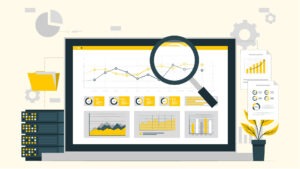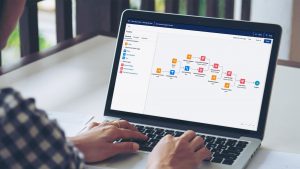In today’s business world, understanding the customer in detail is a vital requirement for success. With the explosion of Big Data and Artificial Intelligence (AI), many companies are investing in tools that give them a more precise approach to their potential customers in order to carry out more effective marketing and sales strategies that increases return on investment. Thus, technology has revolutionized traditional business methodologies, making them more competent, faster and necessary. This is the case with lead scoring, a traditional marketing method, now supplemented with predictive AI models.
Traditionally, sales and marketing teams performed lead scoring manually. This method involved assigning scores to potential leads based on various attributes (demographics, behavioral trends, etc.). Based on this score, it was identified whether or not the prospect was ready to close a sale.
This methodology had several drawbacks. First, the data was classified based on the criteria established by the organization and the ideal customer profile was created manually. Specialists relied on their own subjective judgment or past data patterns to assess actions that might be relevant to making a sale. As a result, real opportunities could go unnoticed or, conversely, sales teams focused too much on the wrong prospects based on inaccurate scores. In addition, it had limitations when it came to analyzing voluminous data, as well as requiring more time and effort for a correct score of leads.
For example, a staggering 79% of B2B marketers have not even established the traditional lead qualification, even though companies that excel at nurturing leads generate 50% more sales-ready leads at a 33% lower cost.
This is where Artificial Intelligence comes into play. In the world characterized by Big Data and its constant growth, technological tools are required to ensure competitiveness.
What is predictive lead scoring?
Predictive lead scoring takes the traditional approach to the next level through Big Data and machine learning.
In this way, the key behaviors of current customers and prospects are analyzed through the use of predictive modeling algorithms in order to classify and scale them. From this, they identify which ones are more likely to convert, keep and buy the company’s products and/or services.
Put another way, predictive lead scoring generates an optimal or ideal profile based on past buying behavior trends and then identifies which current prospects best fit this profile.
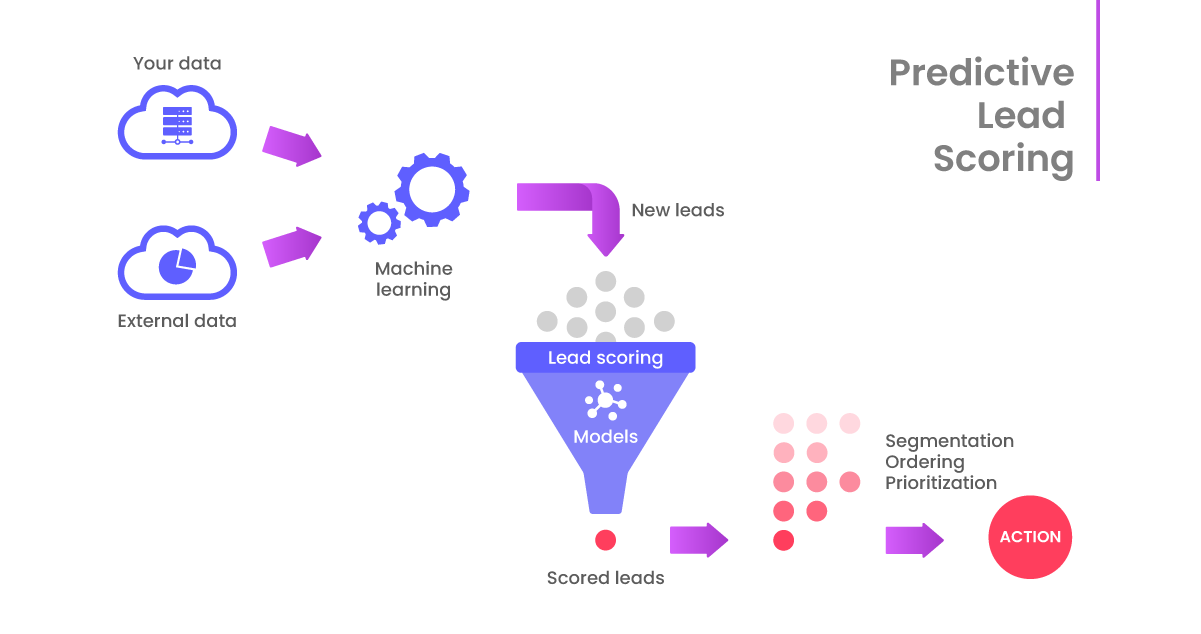
Benefits of Predictive Lead Scoring
The benefits of predictive lead scoring methods are easily visible compared to the traditional methodology. The main ones are:
- Data-centric approach: In the traditional methodology, the factors to be evaluated were based on the subjective judgment of executives and marketing and sales departments, with their biases, assumptions and conjectures. The predictive approach eradicates this and relies on solid data to make its predictions.
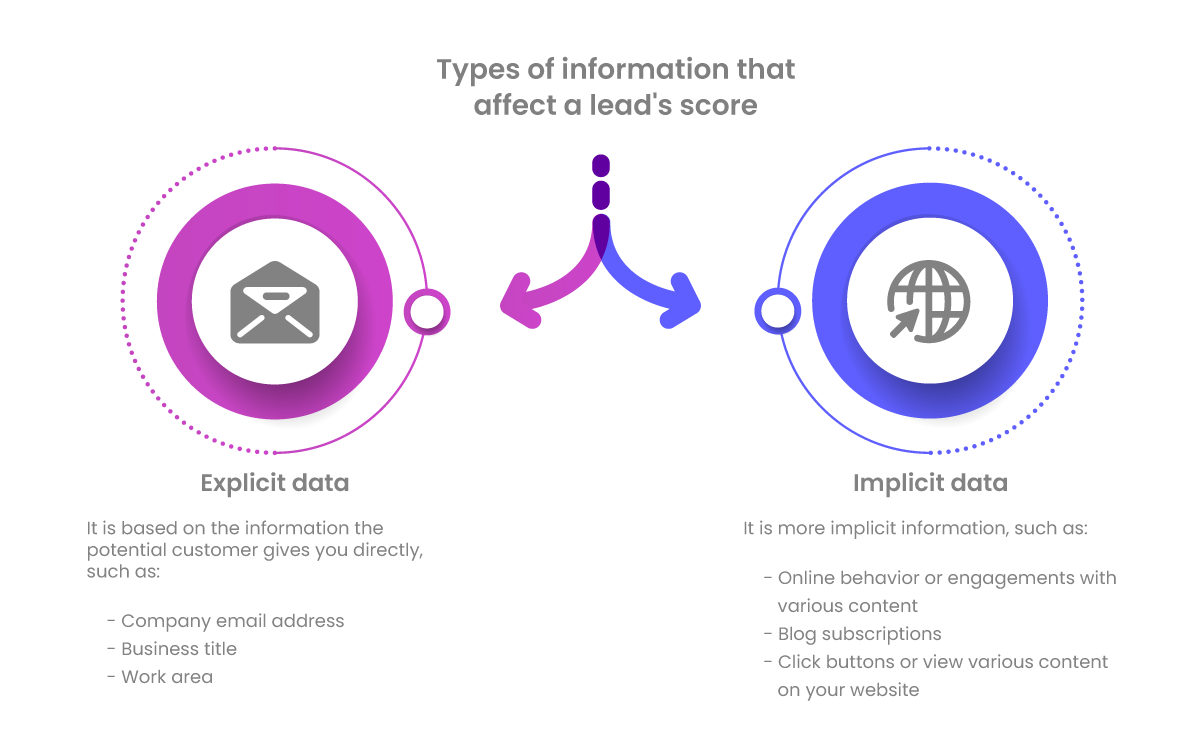
- Reduction of human errors: Thanks to its data-centric approach and the use of AI tools such as machine learning, reduces the possibility of subjective errors due to bias or human judgment.
- Time optimization: the automated prospect score system advantageously substitutes the efforts that the marketing and sales teams traditionally dedicated to it. Now your time can be spent nurturing greater impact on high-scoring prospects.
- Fast and complete results: when using AI tools, of course the results of predictive methods will be faster than manual ones. Likewise, by relating multiple data, it provides a more detailed profile of the prospect, qualitatively improving the accuracy of the scores.
- Improved return on investment (ROI): Predictive scoring methods calculate a score for all leads using machine learning algorithms. This allows you to identify and focus efforts on those prospects who are ready for sales and maximize the rate of return.
- Flexibility to assume the dynamics of changes: Information changes rapidly within the customer base. Therefore, criteria outlined for prospect scoring a few weeks ago may already be outdated. Predictive methods allow that, as the data changes, so do the predictions. However, this leads to a close relationship between marketing and AI. Marketing must report these changes to ensure a good outcome of machine learning.
- Harmony between the marketing and sales teams: a more precise qualification of the potential clients unites the efforts of both departments for those of higher qualification. Otherwise, a lot of leads may come in, but not many deals will end up closing, which can cause a contradiction between both teams, as marketing may not understand why they provide a lot of leads that sales can’t close.
How does it work?
The first step in prospect scoring methods is to identify the key attributes generated by your current and potential customers in their relationship with the company; as well as define the target metric for optimization. This can be conversion rate, retention rate, performance percentage or quality of service, among others. Key attributes can be defined as the characteristics that potential customers possess. For processing purposes, they will be considered independent variables and may include:
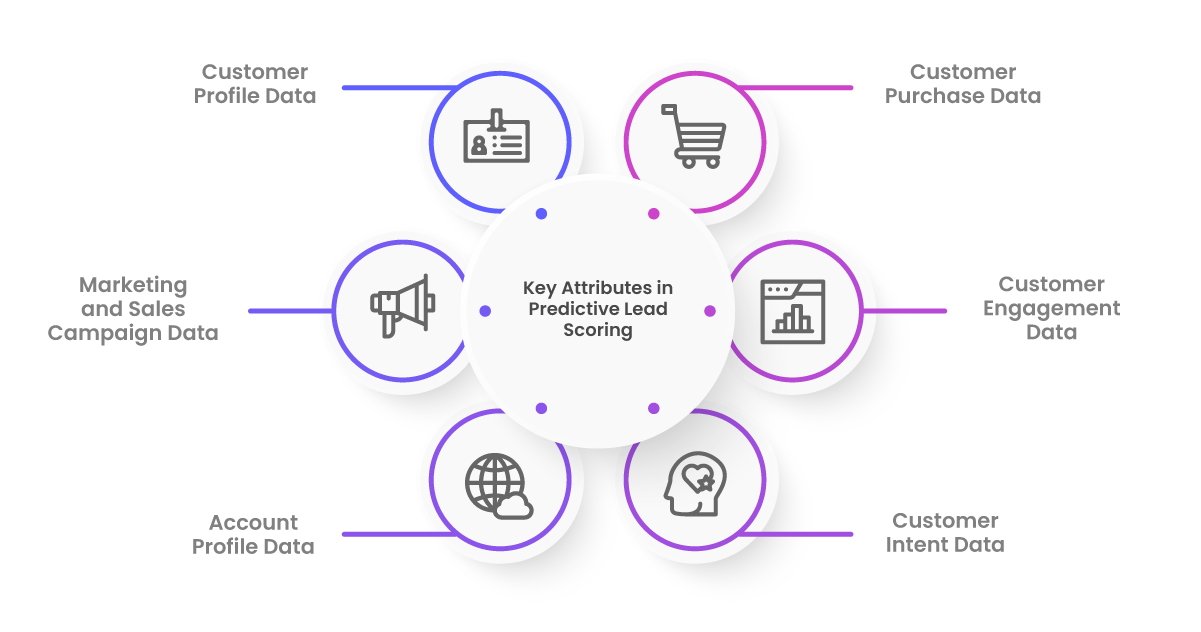
Key Attributes in Predictive Lead Scoring:
- Customer Profile Data: Includes customer demographic information such as location and address, date of birth, name, age, job title, industry, seniority, people segments. etc.
- Customer purchase data: purchase history information about the customer, such as money spent on product purchases, product quality, time and frequency of purchases, payments made online or offline, etc.
- Customer Engagement Data: collects customer’s online behavior, email activities such as CTO, CTR; website activities such as visits, form filling, product/service page views or downloads, creation of guest accounts, registration or activation of free or paid trials, attendance at online seminars or events, etc.
- Customer intent data: includes the interests revealed by current and potential customers in specific products and services, as well as their willingness to be contacted by marketing and sales teams.
- Account Profile Data: Information about account type, company size, industry, etc.
- Marketing and sales campaign data: Campaigns typically get customers and leads from various channels, including direct search, paid, organic, referrals, social media, and more. Identifying the highest performing channels allows you to more effectively engage with current and potential customers and focus on optimizing the most functional channels.
Once the key attributes and goal are identified, the predictive method uses machine learning algorithms to create a model that can accurately score customers based on the data. The model evaluates the relationship between various attributes with customers, prospects and the optimal profile; thus it qualifies them based on their propensity to achieve the desired behavior. Such models can efficiently handle massive amounts of data while analyzing the flaws that caused potential customers to reject products and/or services.
Limitations
Even with all its benefits, predictive lead scoring has some limitations.
- Requires a large amount of data: To accurately predict lead scoring it requires access to massive amounts of customer data to train the machine learning model and identify customer behavior patterns.
- Requires strong technical expertise: Implementing a predictive lead scoring model from scratch requires a strong technical understanding and skill set. Implementing predictive lead scoring also requires knowledge of machine learning, big data, and artificial intelligence.
Salesforce Einstein Lead Scoring
Predictive lead scoring techniques can, and should, be easily integrated with CRM platforms to complement each other and offer greater competitive advantage. Of course, Salesforce is leading the way in this regard. In previous articles we have emphasized how Salesforce is committed to fostering a proper data culture within its solutions. For this reason, it bets on models based on data and points for the scoring of potential clients, making use of the capabilities of its incredible Einstein tool.
Salesforce Einstein Lead Scoring, available within Sales Cloud solutions, helps you create an automated predictive scoring model customized for your business. Such a model can be used by marketing and sales teams to identify and prioritize leads and convert them into customers.
Undoubtedly, predictive models based on artificial intelligence have strengthened and taken the lead scoring to a higher level. Currently, they represent one of the most decisive tools in profitability and business success.
For its part, Salesforce Einstein Lead Scoring becomes one of the best solutions in this field. For those companies that do not have an internal data science team, it is an irreplaceable asset. You can increase conversion rates and accurately redirect relationships with your target audience. Plus, it’s highly customizable to meet the demands of almost any business. If you need help with Einstein Lead Scoring, the SkyPlanner team can help. Write to us at hello@theskyplanner.com.
